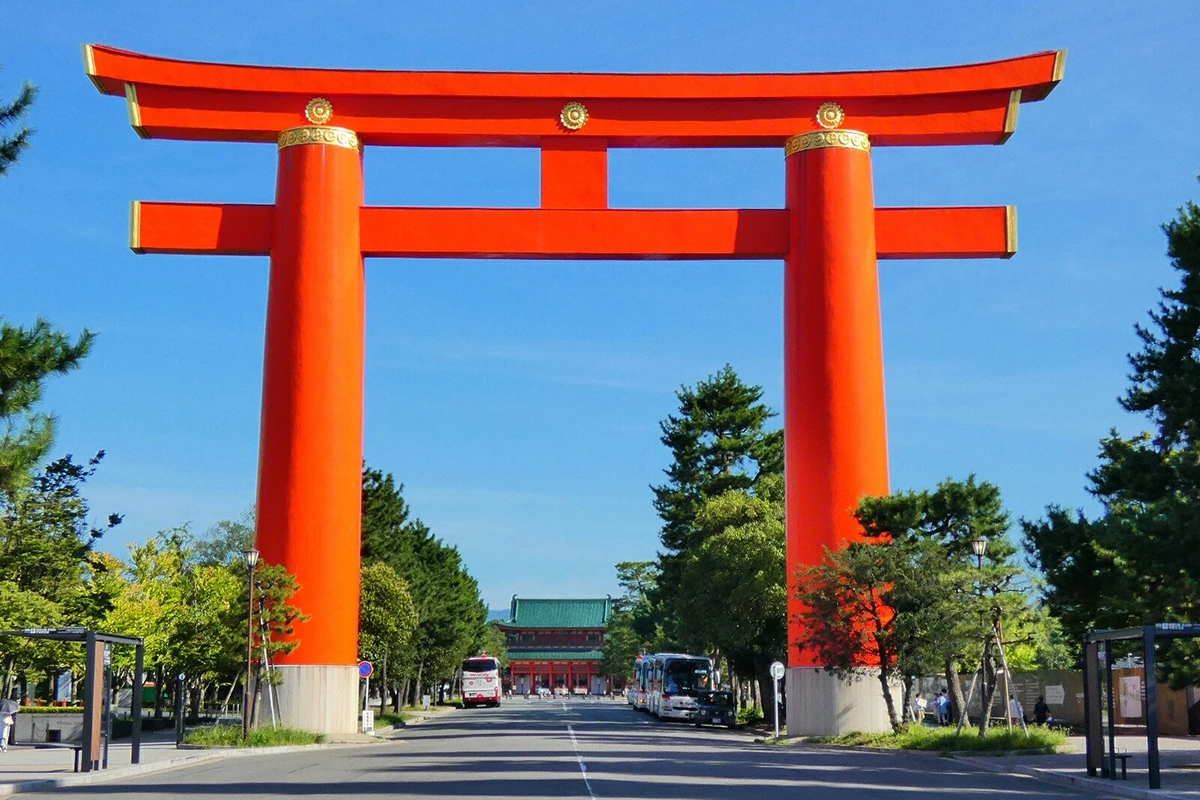Heian Shrine: A Timeless Journey Through Kyoto’s History and Beauty”
Nestled in the heart of Kyoto, Japan, the Heian Shrine stands as a testament to the city’s rich history and enduring culture. This captivating destination, built in 1895 to celebrate Kyoto’s 1,100th anniversary, transports travelers to the bygone era of the Heian period, boasting traditional Japanese architecture, lush gardens, and vibrant cultural celebrations that make it a must-visit attraction.
A Tribute to Kyoto’s Legacy
The Heian Shrine was conceived in the late 19th century, born from a desire to commemorate Kyoto’s incredible 1,100-year history as Japan’s imperial capital. The shrine’s design was a nod to the Heian period, a time marked by peace and prosperity. The construction spanned nearly two decades, employing materials and techniques that echoed the era’s architectural excellence.
Blossoms of June: The Iris Festival
Visiting the Heian Shrine in June promises a visual feast as the vibrant Iris Festival comes into full bloom. The shrine’s gardens are adorned with an array of iris flowers in a kaleidoscope of colors and sizes. Stroll through this enchanting display, enveloped in serenity, and immerse yourself in the sheer beauty of these delicate blooms. The Iris Festival is a captivating spectacle that paints Kyoto in shades of elegance each June.
Jidai Matsuri: A Journey Through Time
October 22nd marks a special day at Heian Shrine with the grand celebration of the Jidai Matsuri, or Festival of the Ages. This extraordinary event pays homage to Kyoto’s history and culture through a magnificent parade featuring over 2,000 participants donning meticulously crafted traditional costumes, representing various eras of Japanese history. The procession culminates at the Heian Shrine, where an authentic ceremony adds an air of solemnity and grandeur.
Exploring the Elysian Grounds
Heian Shrine’s appeal extends far beyond its cultural festivals. The sprawling grounds are a paradise for explorers and nature enthusiasts alike. The Inner Garden, a tranquil oasis within the city, beckons with its large pond, a charming tea house, and an ever-changing landscape of seasonal flowers and plants. In the autumn months, the garden transforms into a symphony of colors as leaves turn vibrant shades of red and gold.
A Glimpse into Heian’s Architecture
The shrine itself is a masterpiece of architectural finesse, adorned with intricate details that speak to the dedication and craftsmanship of its builders. It is here that visitors pay their respects to Emperor Kammu and Emperor Komei, pivotal figures in Kyoto’s history.
A Visual Feast of Weeping Cherry Trees
A visit to Heian Shrine is incomplete without exploring its stunning paid garden. This verdant oasis boasts a rich variety of flora, picturesque ponds, and elegant buildings. Its most breathtaking feature is the profusion of weeping cherry trees, which bloom a few days later than their counterparts, offering visitors a stunning cherry blossom experience towards the end of the season, usually around mid-April.
Special Events and Cultural Celebrations
Occasionally, Heian Shrine’s expansive courtyard becomes a stage for special events, with the Jidai Festival being the highlight. This annual spectacle, held on October 22nd, marks the foundation of Kyoto and features a captivating parade that transports you through Japan’s diverse historical epochs.
Getting There
Reaching Heian Shrine is both convenient and a scenic adventure. Hop on Kyoto City bus number 5 from Kyoto Station for a half-hour journey (230 yen), or opt for the subway via Karasuma Oike Station to Higashiyama Station (20 minutes, 260 yen). From Higashiyama Station, a leisurely ten-minute walk brings you to this remarkable destination.
In conclusion, the Heian Shrine invites travelers to step back in time and immerse themselves in Kyoto’s rich history and breathtaking natural beauty. Whether you visit during the Iris Festival, the Jidai Matsuri, or any other time of the year, Heian Shrine promises an unforgettable journey through the heart and soul of Kyoto, making it a timeless treasure of Japan’s cultural heritage.
